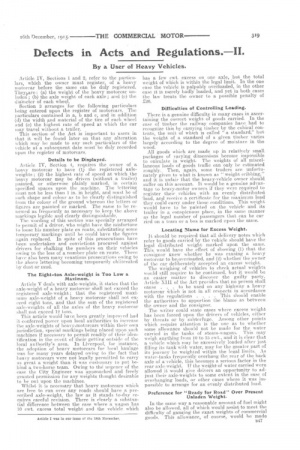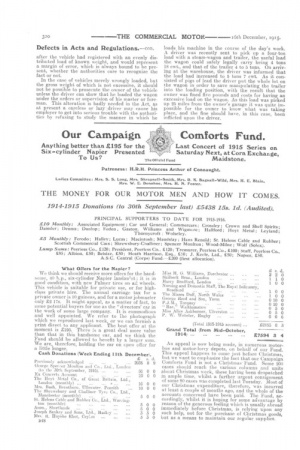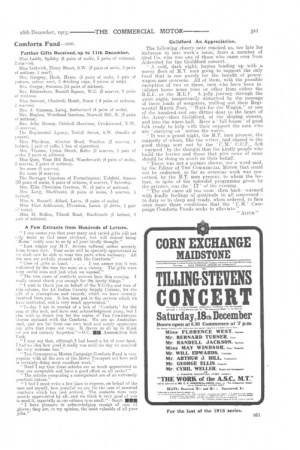Defects in Acts and Regulations.
Page 15

Page 16

Page 17

If you've noticed an error in this article please click here to report it so we can fix it.
By a User of Heavy Vehicles.
Article IV, Sections 1 and 2, refer to the particulars, which the owner must register, of a heavy motorcar before the same can be duly registered. Theyoare: (a) the weight of the heavy motorcar unladen; (b) the axle weight of each axle ; and (e) the diaineter of each wheel.
Section 3 arranges for the following particulars being entered upon the register of motorcars. The particulars contained in a, b and c, and in addition (d) the width and material of the tire of each wheel and (e) the highest rate of speed at which the car may travel without a trailer.
This section, of the Act is important to users in that it will be found later on that any alteration which may be made to any such particulars of the vehicle at a subsequent date must be duly recorded upon the register of motorcars.
Details to be Displayed.
Article IV, Section 4, requires the owner of a heavy motorcar to have (1) the registered -axleweights ; (2) the highest rate of speed at which the heavy motorcar may be driven (without a trailer) painted, or otherwise plainly marked, it, certain specified spaces upon the machine. The lettering must not be less than 1 in. in height, and must be of such shape and colour as to he clearly distinguished from the colour of the ground whereon the letters or figures are painted or marked. The same to be renewed as frequently as necessary to keep the above markings legible and clearly distinguishable.
The wording of this section was specially arranged to permit of a driver, who might have the misfortune to loose his number plate en route, substituting sonic temporary markings until he could have the figufes again replaced. In spite of this prosecutions have been undertaken and convictions procured against drivers for chalking the numbers on their vehicles owing to the loss of a number plate en. route. There have also been many vexatious prosecutions owing to the above lettering becoming temporarily obliterated by dust or mud.
The Eight.ton Axle-weight is Too Low a Maximum.
Article V deals with axle-weights, it states that the axle-weight of a heavy motorcar shall not exceed the registered axle-weight; that the registered maximum axle-weight of a heavy motorcar shall not exceed eight tons, and that the sum of the registered axle-weights of all the axles of the heavy motorcar shall not exceed 12 tons.
This article would have been greatly improved had it conferred power upon local authorities to increase the axle-weights of heavermotorcars within their own jurisdiction, special markings being placed upon such machines if necessary to permit readily of their identification in the event of their getting outside of the local authority's area. In Liverpool, for instance, the adoption of heavy motorcars for local haulage was for many years delayed owing to the fact that heavy motorcars were not legally permitted to carry as great a weight than it was customary to put behind a two-horse team. Owing to the urgency of the ease the City Engineer was apnaoachect and freely granted permission for any weights thought desirable to be out upon the machines.
Whilst it is necessary that heavy motorcars which are free to run over any roads should have a prescribed axle-weight, the law as it stands to-day requires eareful revision. There is clearly a substantial difference between the case where a wagon has 10 cwt. excess total weight. and the vehicle which has a few cwt. excess on one axle, but the total weight of which is within the legal limit. In the one case the vehicle is palpably overloaded, in the other case it is merely badly loaded, and yet in both cases the law treats the owner to a possible penalty of 220.
Difficulties of Controlling Loading.
There is a genuine difficulty in many cases in ascertaining the correct weight of goods carried. In the case of timber the railway companies have had to recognize this by carrying timber by the cubical contents, the unit of which is called " a standard," hut the weight of .a standard of a given thither varies largely according to the degree of moisture in the wood,
All goods which are made up in relatively small packages of varying dimensions become impossible to calculate in weight. The weights of all miscellaneous loads of goods traffic can only be estimated roughly. Then, again, some traders are unfortunately given to what is known as "weight cribbing," and it is unfair that the heavy-vehicle owner should suffer .on this account. It would be a genuine advantage to heavy-motor owners if they were required to register their vehicles with an evenly distributed load, and receive a certificate for the maximum load they could carry under those conditions. This weight would have to be painted on the vehicle and its trailer in a conspicuous place, in the same manner as the legal number of passengers that can be car ried on. a tram or a bus is marked upon the same.
Locating 5lame for Excess Weight.
It should be required that all delivery notes which refer to goods carried by the vehicle should have the legal distributed weight. marked upon the same. This would have the effect of showing (1) that the consignor knew whether he was causing a heavy motorcar to be;overioaded, and (2) whether the owner of the car deliberately accepted an excess weight. The weighing of vehicles to check actual weights would still require to be continued, but it would be an easier matter to discover the guilty party. Article XIII of the Act provides that no person shall cause . to be used on any highway a heavy motorcar which is not in all respects in accordance with the regulations . . . This should enable the authorities to apportion the blame as between the owner and the consignor.
• The writer could state cases where excess weight has been forced upon the drivers of vehicles, either by threats or by subterfuge. Among other points which require attention is the one as to whether some allowance should not be made for the water carried in the tanks of steam-wagons. This may weigh anything from 10 to 15 cwt., and it is clear that a vehicle which may be excessively loaded after just filling its tank with water, may for the greater part of its journey be weighted within the legal limits. As water-tanks frequently overhang the rear of the back axle of a-vehicle, this becomes a serious factor in the rear axle-weight. If the weikht,of water carried were allowed it would give drivers an opportunity to adjust their axle-weights to some extent in the case of overhanging loads, or other cases where it was impossible to arrange for an evenly distributed load.
. Preference for "Ready for Road" Over Present Unladen Weight.
In the same way a reasonable amount of fuel might also be allowed, all of which would assist to meet the difficulty ofganging the exact weights of commercial goods. This allowance, of course, would be made
Defects in Acts and Regulations.—con.
after the vehicle had registered with an evenly distributed load of known weight, and would represent a margin of error, which is always bound to be present, whether the authorities care to recognize the fact or not In the case of vehicles merely wrongly loaded, but the gross weight of which is not excessive, it should not be possible to prosecute the owner of the vehicle unless the driver can show that he loaded the wagon under the orders or supervision of his master or foreman. This alteration is badly needed in the Act, as at present a careless or lazy ,driver may cause his employer to get into serious trouble with the authorities by refusing to study the manner in which he
loads his machine in the course of the day's work. A driver was recently sent to pick up a four-ton load with a steam-wagon and trailer, the useful load the wagon could safely legally carry being 4 tons 18 cwt., and that of the trailer 4 to 5 tons. On arriving at the warehouse, the driver was informed that the load had increased to 5 tons 7 cwt. As it consisted of pigs of lead the driver put the whole lot on the wagon in order to save manipulating the trailer into the loading position, with the result that the owner was fined five pounds and costs for having an excessive load on the wagon. As this load was picked up 25 miles from the owner's garage it was quite impossible for the owner to know what was taking place, and the fine should have, in this case, been inflicted upon the driver.
What Offers for the Napier ?
We think we should receive more offers for the handsome, 40 h.p., six-cylinder Napier landaulet; it is in good condition, with new Palmer tires on all wheels. This vehicle is suitable for private use, or for highclass private hire. The annual carriage tax for a private owner is 10 guineas, and for a motor jobmaster only 22 17s. It might appeal, as a matter of fact, to some potential buyers for use as the "directors' car in the work of some large company. It is commodious and well appointed. We refer to the photograph which we reproduced last week, or we can furnish a print direct to any applicant.. The best offer at the moment is 2195. There is a great deal more value than that in this handsome car, and we think the Fund shoaild be allowed to benefit by a larger sum. We are, therefore, holding the car on cpen offer for a little longer.
Cash Donations (Week Ending 11th December). s.. d. An appeal is now being made, in numerous motorbus and motor-lorry depots, on behalf of our Fund. This appeal happens to come just before Christmas, but we want to emphasize the fact that our Campaign Comforts Fund is not a Christmas Fund. Some 200 cases should reach the various columns and units about Christmas week, these having been despatched in ample time, whilst a further urgent consignment of some 80 cases was completed last Tuesday. Most of our Christmas expenditure, therefore, was incurred at least a couple of months ago, and the whole of the accounts concerned have been paid. The Fund, accordingly, whilst it is hoping for some advantage by reason of the generous feeling which is usually abroad immediately before Christmas, is relying upon any such help, not for the purchase of Christmas goods, but as a means to maintain our regular supplies.
Comforts Fund—con.
Further Gifts Received, up to 11th December,
Miss Ladds, Spilsby (8 pairs of socks, 3 pairs of mittens), 2 scarves).
Miss Leftwich, Ebur7 Street, S.W. (3 pairs of socks, 3 pairs of mittens, 1 scarf).
Mrs. Gregory, Hook, Hants. (3 pairs of socks, 1 pair of puttees, cotton wool, 2 drinking cups, 3,pieces of soap). Mrs. Gregor, Swansea (15 pairs of mittens).
Mrs. Edmondson, Russell Square, W.C. (3 searves, 2 pairs of mittens). .
Miss Stewart, Chadwell Heath, Essex ( 4 pairs of mittens, 2 scarves). ..
Mrs. J. Simpson, Laing, Sutherland (4 pairs of socks). Mrs. Hughee, Woodland Gardena, Musv,ell Hill, N. (3 pairs of mittens).
Mrs. John Mcssop, Chichell Mansions, Cricklewood, N.W. (3 scarves).
The Regimental Agency, Tothill Street, S.W. (bundle of papers).
Miss Phythian, Allerton Road, Wootton (2 scarves, 1 helmet, I. pair of cuffs, 1 box of cigarettes). Mrs. Thomas, Union Street, Kelso (2 scarves, 1 pair of socks, 2 pairs of mittens).
Miss Quin, West Hill Road, Wandsworth (4 pairs of socks, 2 scarves, 2 pairs of mittens).
No name (2 scarves).
No name (4 scarves).
The Dowager Countess of Portarlington, Uckfield, Sussex
(30 pairs of socks, 8 pairs of mittens, 6 scarves, 7 helmets). Mrs. Ellis, Cheniston Gardens, W. (4 pairs of mittens). Mrs. Long, Blackheath (8 pairs of socks, 3 scarves, 1
helmet).
ISliss A. Rennell, Alford, Lanes. (4 pairs of socks).
Miss Alice Ashburncr, Illverston, Lancs. (3 shirts, 1 pair of socks).
Miss 31. Bedloe, -Ulundi Road, Blackheath (1 helmet, 1 pair of mittens).
A Few Extracts from Hundreds of Letters.
'I can assure you that your many and varied gifts will not only make us foal more civilized, but will indeed bring
• Home' really near to us by all your kindly thought."
"Last winter our M.T. drivers suffered rather severely from frozen feet.. Your socks will be specially appreciated as we shall new be able to wear two pairs when necessary. All the men are awfully pleased with the Comforts."
" Case of gifts to hand. . . . I can assure you it was welcomed by the men the same as a victory. The gifts were very useful ones and just what we wanted."
" The two cases of comforts arrived here this evening. I really cannot thank you enough for the lovely things." "I wish to thank you on behalf of the N.C.O.s and men of this column, the 1st Indian Cavalry Supply Column, for the gift of a gramophone and records, which we have recently received from you. It has been put in the canteen which we, have instituted, and is very much appreciated."
"To-day I am in receipt of a box of 'Comforts' for the men of this unit, and have sent acknowledgment along, but I also wish to thank you for the copies of TILE COMMERCIAL MOTOR enclosed with the Comforts. We are an Australian unit, and are far from our own land and surely appreciate any gifts that come our way. It cheers us all up to think we are not entirely forgotten."—O.C. NM Ammunition Sub Park.
"I may say that, although I had heard a lot of your fund, I had no idea how good it really was until the day we received the very welcome box."
"TILE COMMERCIAL MOTOR Campaign Comforts Fund is very popular with all the men of the Motor Transport out here and is certainly doing most excellent work."
" Need I say that these articles are as much appreciated as they are acceptable and have a good effect on all ranks?" "The articles compriSing a consignment are of an extremely practical nature."
" I feel I must write a few lines to express, on behalf of the men and myself, how grateful we are for the case of assorted comforts which has just arrived. The contents were very greatly appreciated by all, and we think it very good of you to send it, especially as our coltunn is so smalL"—Sergt. MEN "I have pleasure in acknowledging receipt of case of gloves; they are, in my opinion, the Most valuable of all your gifts."
Guildford—An Appreciation.
The following cheery note reached us, too late for inclusion in last week's issue, from a member of 52nd Co. who was one Of those who came over from Aldershot for the Guildford concert.
" A cold, dark night, lorries loading up with a merry fleet of M.T. men going to support the only fund that is run purely for the benefit of powerwagon men overseas. All of them, with the possible exception of two or three, men who havebeen invalicied home some time or other from either the B.E.F. or the M.E.F. A jolly journey through the quiet night,momentarily disturbed by the passage of these loads of songsters, trolling out their Regimental March Past, " Wait for the Wagon," or one of the hundred and one ditties dear to the heart of the Army—then Guildford, of the sloping streets, and into the warm hall. Here a full house' of good folk ready to help with their support the men who are ' carrying on across the water.
" It was a grand night, the M.T. men present, the majority of whom, like the writer, had shared in the good things sent out by the C.C.F., felt warmed ' by the thought that the kindly people who build the lorries and those that give news of same should be doing so much on their behalf.
" There was not a picture shown, nor a word said, by the Editor of Ti COMMERCIAL MOTOR that could not he endorsed, so far as overseas work was concerned, by the M.T. men present, to whom the lecture, in spite of the splendid programme given by the artistes, was the IT ' of tho evening. "The end came all too soon—then back—warmed with kindly feelings of gratitude to all concerned— to duty or to -sleep and ready, when ordered, to face once more those conditions that the C.M.'. Campaign Comforts Funds seeks to alleviate."
"..krren."




















